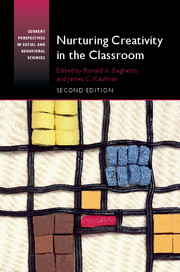Book contents
- Frontmatter
- Dedication
- Contents
- Preface
- Acknowledgments
- PART I VOICES FROM THE FIELD
- 1 Changing the Subject
- 2 Creativity and the Invention Convention
- 3 Creativity and Shifting Roles of an Educational Leader: A Reflection of What Creativity Used to Mean to Me and What It MeansNow
- 4 What I Used to Think about Creativity in Schools
- PART II VOICES FROM THE RESEARCH
- Index
1 - Changing the Subject
from PART I - VOICES FROM THE FIELD
Published online by Cambridge University Press: 24 November 2016
- Frontmatter
- Dedication
- Contents
- Preface
- Acknowledgments
- PART I VOICES FROM THE FIELD
- 1 Changing the Subject
- 2 Creativity and the Invention Convention
- 3 Creativity and Shifting Roles of an Educational Leader: A Reflection of What Creativity Used to Mean to Me and What It MeansNow
- 4 What I Used to Think about Creativity in Schools
- PART II VOICES FROM THE RESEARCH
- Index
Summary
What should students learn in the 21st century? At first glance, this question divides into two: What should students know, and what should they be able to do? Knowledge and skills. For more than a century, policy makers and educators have drawn a sharp distinction between the two – between college preparatory and technical education. John Dewey argued against this division early in the 20th century. It is now way past time to integrate hands and minds, as the skills and knowledge required for “college” and “career” have become virtually identical.
But there is more at issue than knowledge and skills. For the innovation economy, dispositions come into play: learning to learn, readiness to collaborate, seeing from multiple perspectives, initiative, persistence, and curiosity. While the content of any learning experience is important, the particular content is irrelevant. What matters is how students apply it, react to it, or shape it. The purpose of learning in this century is not simply to recite inert knowledge, but rather to transform it. It is time to change the subject.
This is no small matter. For more than a century, the whole point of schooling has been to restrict the curriculum, specify the content, keep it inert, and limit the entry points to it – often by means of a watered-down, already obsolete text, mediated by a manager tasked with transmitting the content to 30 or more individuals of diverse backgrounds, experiences, and resources. This is particularly true of the “big four” core subjects that the Carnegie Commission decided, nearly a century ago, are the subjects that matter. English, math, science (biology, chemistry, and physics), and social studies count, and the fine and practical arts are irrelevant.
Why not study anthropology, zoology, or environmental science? Why not integrate art with calculus, or chemistry with history? Why not pick up skills and understandings in all of these areas by uncovering and addressing real problems and sharing findings with authentic audiences? Why not study a nearby estuary, invent a useful product that uses electricity, or devise solutions to community problems, all the while engaging in systematic observation, collaborative design, and public exhibitions of learning?
- Type
- Chapter
- Information
- Nurturing Creativity in the Classroom , pp. 3 - 5Publisher: Cambridge University PressPrint publication year: 2016
- 2
- Cited by



